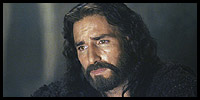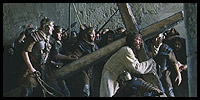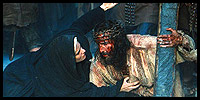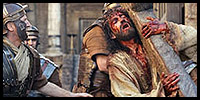
 |
|
The Passion Of Cast: Jim Caviezel, Maia Morgenstern, Monica Bellucci, Hristo Naumov Shopov, Claudia Gerini, Luca Lionello, Francesco DeVito, Hristo Jivkov, Sergio Rubini, Mattia Sbragia, Fabio Sartor, Toni Bertorelli, Roberto Bestazzoni, Matt Petresi, Jarreth Merz, Francesco Cabras, Rosalinda Celentano 2004 – 127 minutes Rated: Reviewed by Dustin Putman, February 27, 2004.  The increasingly frenzied controversy rustled up in recent weeks over "The Passion of the Christ" has caught most all of the general public by surprise, despite the very sad knowledge that a religious-themed motion picture cannot be made in today's times without someone throwing a baby fit simply because their beliefs do not coincide exactly with the opinions of the cinematic work itself. Although the hubbub has been notable on a historical level and single-handedly turned this foreign-language art film into a box-office record-breaker (independently made and financed for $30-million by Mel Gibson, it almost made back the entire budget on opening day), it also turns out to be subjectively unfounded. "The Passion of the Christ" is violent and blood-soaked, but nowhere near the most graphically violent or blood-soaked I've seen. The movie closely follows the words of the New Testament; for those audience members who have a problem with its teachings, relax and at least be satisfied that it is being faithful to at least one widespread belief system. And as for those protesters screaming out over supposed anti-Semitism, they clearly have missed the whole point altogether.
The increasingly frenzied controversy rustled up in recent weeks over "The Passion of the Christ" has caught most all of the general public by surprise, despite the very sad knowledge that a religious-themed motion picture cannot be made in today's times without someone throwing a baby fit simply because their beliefs do not coincide exactly with the opinions of the cinematic work itself. Although the hubbub has been notable on a historical level and single-handedly turned this foreign-language art film into a box-office record-breaker (independently made and financed for $30-million by Mel Gibson, it almost made back the entire budget on opening day), it also turns out to be subjectively unfounded. "The Passion of the Christ" is violent and blood-soaked, but nowhere near the most graphically violent or blood-soaked I've seen. The movie closely follows the words of the New Testament; for those audience members who have a problem with its teachings, relax and at least be satisfied that it is being faithful to at least one widespread belief system. And as for those protesters screaming out over supposed anti-Semitism, they clearly have missed the whole point altogether.
 What one takes away from "The Passion of the Christ" likely will be based on who they are, what they know, and what they think as they make their way into the theater. The storytelling and characters, vague and insular, do no favors for those with little knowledge on the subject matter. You do not, however, have to be a devout Catholic or Jew to appreciate and be affected by what filmmaker Mel Gibson has accomplished with his dream project. Without following any certain organized religion (I like to term my own personal religion as that of "free-thinker"), I was moved by the undeniably powerful images on display and found myself deeply sympathizing with the film's moral of expressing unconditional love to all, despite the sins we commit and our differences in the world. In the most polite terms possible, certain religious sectors that lack open-mindedness and acceptance could learn a thing or two from Gibson and co-screenwriter Benedict Fitzgerald.
What one takes away from "The Passion of the Christ" likely will be based on who they are, what they know, and what they think as they make their way into the theater. The storytelling and characters, vague and insular, do no favors for those with little knowledge on the subject matter. You do not, however, have to be a devout Catholic or Jew to appreciate and be affected by what filmmaker Mel Gibson has accomplished with his dream project. Without following any certain organized religion (I like to term my own personal religion as that of "free-thinker"), I was moved by the undeniably powerful images on display and found myself deeply sympathizing with the film's moral of expressing unconditional love to all, despite the sins we commit and our differences in the world. In the most polite terms possible, certain religious sectors that lack open-mindedness and acceptance could learn a thing or two from Gibson and co-screenwriter Benedict Fitzgerald.
 Save for a handful of key flashbacks in his life, "The Passion of the Christ" takes place wholly within the confines of the final twelve hours leading up to Jesus of Nazareth's (Jim Caviezel) crucifixion. Captured while seeking guidance from his Father in the garden of Gethesemane, Jesus is feared by the self-righteous Pharisees, who are threatened by his claim that he is the Messiah. Roman emperor Pontius Pilate (Hristo Naumov Shopov) is torn. He does not share the Pharisees' extreme viewpoint that Jesus should be put to death, but, fearing a revolt, he finds himself allowing the torture and crucifixion of Jesus over the more just execution of a confirmed murderer.
Save for a handful of key flashbacks in his life, "The Passion of the Christ" takes place wholly within the confines of the final twelve hours leading up to Jesus of Nazareth's (Jim Caviezel) crucifixion. Captured while seeking guidance from his Father in the garden of Gethesemane, Jesus is feared by the self-righteous Pharisees, who are threatened by his claim that he is the Messiah. Roman emperor Pontius Pilate (Hristo Naumov Shopov) is torn. He does not share the Pharisees' extreme viewpoint that Jesus should be put to death, but, fearing a revolt, he finds himself allowing the torture and crucifixion of Jesus over the more just execution of a confirmed murderer.
 Other major characters figure into the limited timeline. Judas (Luca Lionello) is so overcome with guilt after giving Jesus' whereabouts away in exchange for money that it ultimately leads to his own suicide. Apostle Peter (Francesco De Vito) denies knowing his teacher in a selfish and dishonest bid to save his own life. Meanwhile, Mary Magdalen (Monica Bellucci) and Jesus' mother, Mary (Maia Morgenstern), are devastated by the impending death of a loved one whom they can do nothing to save.
Other major characters figure into the limited timeline. Judas (Luca Lionello) is so overcome with guilt after giving Jesus' whereabouts away in exchange for money that it ultimately leads to his own suicide. Apostle Peter (Francesco De Vito) denies knowing his teacher in a selfish and dishonest bid to save his own life. Meanwhile, Mary Magdalen (Monica Bellucci) and Jesus' mother, Mary (Maia Morgenstern), are devastated by the impending death of a loved one whom they can do nothing to save.
 As admirable and technically staggering as "The Passion of the Christ" is (more on this to come), it is far from a perfect motion picture. The sporadic flashbacks offers too-fleeting glimpses into Jesus' life; a loving moment he shares with his mother after crafting a wooden table and his final speech during the Last Supper are devastating, but most of the other past digressions are too simplistic to ratchet much of an impression. Wide attention has been garnered from the film's prolonged and gruesome depiction of Jesus' scourging and subsequent crucifixion. While its portrayal is, indeed, detailed and graphic, these sequences of torture (taking up roughly 90 minutes of its 127-minute running time) overstay their welcome. So brutal and painstakingly slow-moving is Jesus' scourging and death walk with the cross that the viewer finally becomes immune to the violence and must question if its wallowing on these scenes serves a definite purpose or is merely slasher movie-style exploitation. A wealth of footage could have easily been left on the cutting room floor without having any dire effect on its overall emotional weight.
As admirable and technically staggering as "The Passion of the Christ" is (more on this to come), it is far from a perfect motion picture. The sporadic flashbacks offers too-fleeting glimpses into Jesus' life; a loving moment he shares with his mother after crafting a wooden table and his final speech during the Last Supper are devastating, but most of the other past digressions are too simplistic to ratchet much of an impression. Wide attention has been garnered from the film's prolonged and gruesome depiction of Jesus' scourging and subsequent crucifixion. While its portrayal is, indeed, detailed and graphic, these sequences of torture (taking up roughly 90 minutes of its 127-minute running time) overstay their welcome. So brutal and painstakingly slow-moving is Jesus' scourging and death walk with the cross that the viewer finally becomes immune to the violence and must question if its wallowing on these scenes serves a definite purpose or is merely slasher movie-style exploitation. A wealth of footage could have easily been left on the cutting room floor without having any dire effect on its overall emotional weight.
 Other sections are hauntingly beautiful and palpably threatening at the same time. The opening scenes set in the atmospheric, fog-shrouded garden of Gethsemane, and including Jesus' encounter with Satan (Rosalinda Celentano), are frightening in how assuredly they burrow under your skin. So is the final crucifixion and subtle climactic depiction of his resurrection, so brave and superbly crafted that they impact the viewer on both an emotional and spiritual level in a way the more physically unsettling scourging lacks.
Other sections are hauntingly beautiful and palpably threatening at the same time. The opening scenes set in the atmospheric, fog-shrouded garden of Gethsemane, and including Jesus' encounter with Satan (Rosalinda Celentano), are frightening in how assuredly they burrow under your skin. So is the final crucifixion and subtle climactic depiction of his resurrection, so brave and superbly crafted that they impact the viewer on both an emotional and spiritual level in a way the more physically unsettling scourging lacks. Bringing a level of truth and humanity to the proceedings is Maia Morgenstern's breathtaking, tragic portrayal of Mary. Morgenstern enlightens Mary with the believability of authentic motherly love and regret that comes with having to witness your child's death—even one she understands must come to pass. As for the work of Jim Caviezel (2001's "Angel Eyes"), what is there to say except that his performance is a powerhouse of difficult, exhaustive emotions. Physically, Caviezel is flawless in his representation of Jesus' likeness, but he goes one step further by also transcendently embodying his heart, his goodness, his suffering, and his power to forgive.
Bringing a level of truth and humanity to the proceedings is Maia Morgenstern's breathtaking, tragic portrayal of Mary. Morgenstern enlightens Mary with the believability of authentic motherly love and regret that comes with having to witness your child's death—even one she understands must come to pass. As for the work of Jim Caviezel (2001's "Angel Eyes"), what is there to say except that his performance is a powerhouse of difficult, exhaustive emotions. Physically, Caviezel is flawless in his representation of Jesus' likeness, but he goes one step further by also transcendently embodying his heart, his goodness, his suffering, and his power to forgive.
 Walking out of "The Passion of the Christ," the notion that most profoundly stuck with me was how Jesus' death was just as foretold and his birth. Jesus knew he had to die in order to carry out his Father's plan for him, and he was willing to sacrifice himself for the good of every other living being on Earth. This is at the heart of the message "The Passion of the Christ" shares—that one should be able to find it within themselves to forgive and love everyone, even sinners and even their own enemies—and so how anyone could call Gibson's filmic account anti-Semitic is mindboggling in its confused narrow-mindedness. He does not support bigotry, but criticizes its inclinations. "The Passion of the Christ" is an epic motion picture, indelibly shot by cinematographer Caleb Deschanel (2003's "Timeline") and scored by John Debney (2004's "Welcome to Mooseport"), that may not have the force and conviction to convert non-believers but may at least get viewers to open their minds to its themes of love, acceptance, and self-sacrifice.
Walking out of "The Passion of the Christ," the notion that most profoundly stuck with me was how Jesus' death was just as foretold and his birth. Jesus knew he had to die in order to carry out his Father's plan for him, and he was willing to sacrifice himself for the good of every other living being on Earth. This is at the heart of the message "The Passion of the Christ" shares—that one should be able to find it within themselves to forgive and love everyone, even sinners and even their own enemies—and so how anyone could call Gibson's filmic account anti-Semitic is mindboggling in its confused narrow-mindedness. He does not support bigotry, but criticizes its inclinations. "The Passion of the Christ" is an epic motion picture, indelibly shot by cinematographer Caleb Deschanel (2003's "Timeline") and scored by John Debney (2004's "Welcome to Mooseport"), that may not have the force and conviction to convert non-believers but may at least get viewers to open their minds to its themes of love, acceptance, and self-sacrifice.
|
© 2004 by Dustin Putman |














